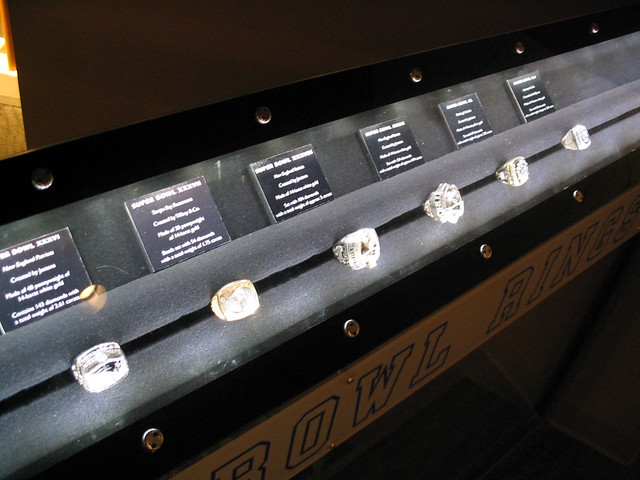
Image courtesy of marada's Flickr page - Pro Football Hall of Fame: https://www.flickr.com/photos/marada/18349271420/in/photolist-s9jx2h-6WanDm-88EBAf-88EBFW-6Wakz7-6WamJ3-6WavG5-6Wapgd-7AA2Cj-eZaZFx-tXsP7C-ucHyh9-5V94An-8qJEgH-744DSK-ofEBCj-7ZjcnY-4qX6xk
Super Bowl XXXIX - New England Patriots 24, Philadelphia Eagles 21. Played on February 6, 2005 at Alltel Stadium, Jacksonville, Florida. MVP Deion Branch. Favorite Patriots by 7. National anthem The combined choirs of the U.S. Military. Halftime show Paul McCartney. Attendance 78,125. Network Fox. Announcers Joe Buck, Troy Aikman, and Cris Collinsworth. Nielsen ratings 41.1. est. 86 million viewers. Market share 62. Cost of 30-second commercial US $2.4 million. Tom Brady 23/33 236 2 0, Deion Branch 11 133, Donovan McNabb 30/51 357 3 3, Terrell Owens 9 122
Unlike the previous Super Bowl, I did not think that this was a particularly interesting or exciting Super Bowl. It featured the two top teams in the league, most likely, as Philly dominated the NFC, and the Patriots convincingly plowed through the AFC playoffs, despite not having home field advantage.
Despite being close, the game was not remarkably well played. New England played well, but Donovan McNabb looked scared out there based on his facial expressions, and the Eagles....well, they did not play as well as they normally did.
Yes, the game was close, but the outcome never really seemed in question, like it did in other close Super Bowls. The Patriots were pretty well outplaying Philly from beginning to end, and there was no incredible finish to be had in this one.
Personal Memories: This was the year that my son was born, and I became a father. This overshadowed all else for this calendar year, and was my tremendous privilege.
Here are some of the major events that took place in 2005, the year this Super Bowl was played. The world's population was 6.4 billion people. Worldwide aid pours in to help the eleven Asian countries devastated by the Dec. 26, 2004, tsunami (Jan.). See Tsunami Factfile. Mahmoud Abbas wins presidency of the Palestinian Authority in a landslide. This is the first presidential election for Palestinians since 1996 (Jan. 9). The Sudanese government and Southern rebels sign a peace agreement to end a 20-year civil war that has claimed the lives of two million people (Jan. 9). Iraqi elections to select a 275-seat National Assembly take place despite threats of violence (Jan. 30). See also Iraq; Iraq Timeline. Former Lebanese prime minister Rafik Hariri—a nationalist who had called for Syria's withdrawal from Lebanon—is assassinated (Feb. 14). Weeks of protests ensue. Violent protests follow elections in Kygyzstan (March 13), which international monitors deem severely flawed. President Askar Akayev flees the country and then resigns (April 4). Pope John Paul II Dies (April 2). Benedict XVI becomes the next pope (April 24). The Syrian military, stationed in Lebanon for 29 years, withdraws (April 26). Tony Blair becomes first Labour Party prime minister to win three successive terms, but his party loses a large number of seats in the elections (May 5). The European Union abandons plans to ratify the proposed European constitution by 2006 after both France and the Netherlands vote against it (June 16). Former Teheran mayor Mahmoud Ahmadinejad, a hard-line conservative, wins Iran's presidential election with 62% of the vote. He defiantly pursues Iran's nuclear ambitions over the course of his first year in office (June 24). London hit by Islamic terrorist bombings, killing 52 and wounding about 700. It is Britain's worst attack since World War II (July 7). Group of Eight industrial nations pledge to double aid to Africa to $50 billion a year by 2010, cancel the debt of many poor countries, and open trade (July 8). Pentagon assessment finds Iraq's police force is, at best, "partially capable" of fighting the country's insurgency. The U.S.'s eventual withdrawal plan hinges upon Iraqi security forces replacing U.S. soldiers: "As Iraqis stand up, Americans will stand down," President Bush had stated (July 20). See also Iraq; Iraq Timeline. The Irish Republican Army announces it is officially ending its violent campaign for a united Ireland and will instead pursue its goals politically (July 27). See also Northern Ireland Peace Process. The Indonesian government and the Free Aceh Movement (GAM) sign a peace accord to end their nearly 30-year-long civil war (Aug. 15). Israel begins evacuating about 8,000 Israeli settlers from the Gaza Strip, which has been occupied by Israel for the last 38 years (Aug. 15). A 7.6 earthquake centered in the Pakistani-controlled part of the Kashmir region kills more than 80,000 and leaves an estimated 4 million homeless (Oct. 2). Angela Merkel, leader of the Christian Democratic Union, which narrowly prevailed over Chancellor Gerhard Schröder's Social Democratic Party in September elections becomes the country's first female chancellor (Oct. 10). Millions of Iraqi voters ratify a new constitution (Oct. 15). Former Iraqi president Saddam Hussein goes on trial for the killing of 143 people in the town of Dujail, Iraq, in 1982 (Oct 19). Several weeks of violent rioting begins in the impoverished French-Arab and French-African suburbs of Paris after two boys are accidentally killed while hiding from police (Oct 27). Ellen Johnson-Sirleaf becomes Africa's first woman elected head of state (Nov. 11). Israeli prime minister Ariel Sharon quits as head of the Likud Party, which he founded, to start a new, more centrist organization, called Kadima (Nov. 21). About 11 million Iraqis (70% of the country's registered voters) turn out to select their first permanent Parliament since the overthrow of Saddam Hussein (Dec. 15).
http://boards.sportslogos.net/topic/98529-super-bowl-field-database-sb-xlvi-texture-added-122215/page-9
Super Bowl XXXIX logo and team helmets:
Super Bowl Rings:

Image courtesy of Ryan Schreiber Flickr page - Super Bowl rings: https://www.flickr.com/photos/ryanschreiber/2966914635/in/photolist-9fhtR7-mTUuPg-7BfrrT-8VABVJ-71329o-dkVSiW-713aji-716t8C-6ZY2fn-aaJzti-bSQYxn-8qJEPk-caGaTw-7s88nt-4qr4K5-gvvHpq-bZ7QUG-5wbdmB-qJWkZK-9TA5tc-712koy-679ZUN-hkLnBw-712XU1-716sLj-712Zih-712YYw-6ZY1P4-712Ys5-6ZXY5z-7131DJ-713g7L-6ZYeHM-6ZYdeF-6ZYdPe-6ZYgjz-6ZYedK-7139TJ-7124Do-9fE3N7-a3dxxG-716YLQ-6ZYbrr-6ZYfMi-6ZYcBx-7138ew-713aSy-dBNXDK-713ehv-46Wiar
No comments:
Post a Comment